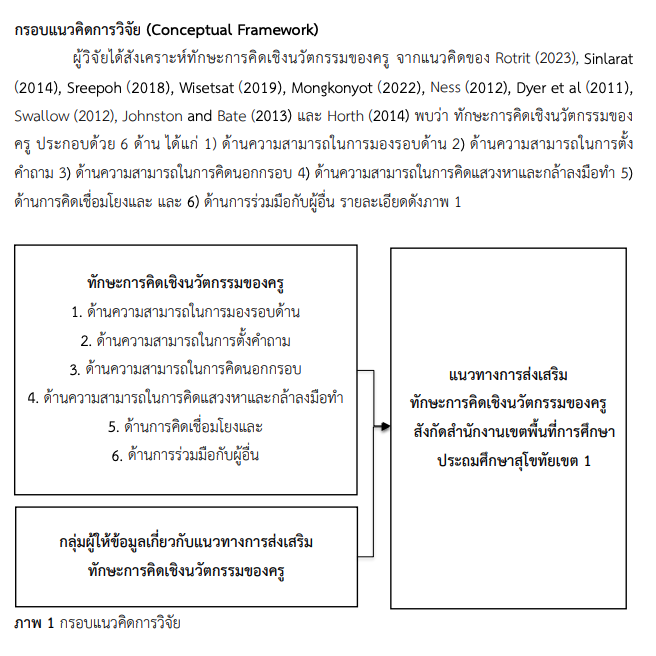แนวทางการส่งเสริมทักษะการคิดเชิงนวัตกรรมของครู สังกัดสำนักงานเขตพื้นที่การศึกษาประถมศึกษาสุโขทัย เขต 1
Main Article Content
บทคัดย่อ
การวิจัยในครั้งนี้มีวัตถุประสงค์เพื่อศึกษาแนวทางการส่งเสริมทักษะการคิดเชิงนวัตกรรมของครูสังกัดสำนักงานเขตพื้นที่การศึกษาประถมศึกษาสุโขทัย เขต 1 โดยแบ่งการวิจัยเป็น 2 ขั้นตอน ขั้นที่ 1 ศึกษาทักษะการคิดเชิงนวัตกรรมของครู กลุ่มตัวอย่าง ได้แก่ ผู้บริหารสถานศึกษา และครู จำนวน 291 คน โดยการสุ่มแบบแบ่งชั้นตามอำเภอ เก็บข้อมูลด้วยแบบสอบถาม และวิเคราะห์ด้วยค่าเฉลี่ย และส่วนเบี่ยงเบนมาตรฐาน ขั้นที่ 2 ศึกษาแนวทางการส่งเสริมทักษะการคิดเชิงนวัตกรรมของครูฯ กลุ่มผู้ให้ข้อมูล ได้แก่ ผู้บริหารสถานศึกษา และศึกษานิเทศก์ ที่มีความรู้และประสบการณ์ในด้านการบริหารสถานศึกษาหรือด้านการพัฒนานวัตกรรม โดยการเลือกแบบเจาะจง เก็บข้อมูลด้วยแบบสัมภาษณ์ และวิเคราะห์เนื้อหา ผลการวิจัยพบว่า 1) ทักษะการคิดเชิงนวัตกรรมของครูฯ อยู่ในระดับมาก โดยทักษะด้านการร่วมมือกับผู้อื่นมีค่าเฉลี่ยสูงสุด และทักษะด้านการคิดนอกกรอบมีค่าเฉลี่ยต่ำที่สุด และ 2) แนวทางการส่งเสริมทักษะการคิดเชิงนวัตกรรมของครูฯ พบว่า ผู้บริหารต้องพัฒนาทักษะการวิเคราะห์ และสังเคราะห์ข้อมูลที่เป็นกระบวนการสำคัญในการยกระดับคุณภาพการศึกษา จัดอบรมเชิงปฏิบัติการที่เน้นเทคนิคการตั้งคำถามระดับสูง สนับสนุนความคิดใหม่ ให้อิสระในการทดลองกระบวนการสอนที่แตกต่าง ส่งเสริมการทำวิจัยในชั้นเรียน และวิจัยเชิงปฏิบัติการ พัฒนากระบวนการคิดเชิงออกแบบ และกระบวนการสร้างนวัตกรรม โดยเน้นการฝึกปฏิบัติจริงจากปัญหาในชั้นเรียน ส่งเสริมให้ครูแลกเปลี่ยนประสบการณ์ความรู้ และออกแบบหลักสูตรที่บูรณาการความรู้โดยใช้เทคโนโลยีสนับสนุน และส่งเสริมวัฒนธรรมการทำงานแบบร่วมมือ
Downloads
Article Details

อนุญาตภายใต้เงื่อนไข Creative Commons Attribution-NonCommercial-NoDerivatives 4.0 International License.
The authors are solely accountable for the ideas and recommendations articulated in the articles published in the LEAD Journal RU. Should there be any inaccuracies, the authors accept full responsibility for such errors.
Moreover, the Editorial Board, Editorial Team, and Committee of the LEAD Journal RU are committed to maintaining the integrity of the principles reflected in the authors' contributions.
Consequently, Ramkhamhaeng University, the Editorial Board, Editorial Team, and Editors shall not be held liable for any outcomes arising from the authors' presentation of their ideas and recommendations within the LEAD Journal RU.
เอกสารอ้างอิง
Amelink, C., Fowlin, J., and Scales, G. (2013). Defining and Measuring Innovative Thinking Among Engineering Undergraduates. In the 120th ASEE Annual Conference and Exposition. American Society for Engineering Education, 10(2), 22-23.
Baiphakdee, K. (2020). Guidelines for Promoting Innovative Thinking Skills of Teachers under the Office of the Vocational Education Commission in Phra Nakhon Si Ayutthaya Province. (Master of Thesis, Rajamangala University of Technology Thanyaburi). [In Thai].
Chaemchoi, S. (2012). Innovative Concepts for Educational Administration in the 21st Century. Naresuan University Journal of Education, 4(2), 117-128. [In Thai].
Dyer, J. H., Hal, B. G. and Clayton, C. M. (2011). The Innovator's DNA: Mastering the Five Skills of Disruptive Innovators. Boston, MA: Harvard Business Press.
George, A. (2012). Understanding Human Behavior. New York, NY: McGraw-Hill.
Horth, D. (2014). Innovation Leadership: How to Use Innovation to Lead Effectively, Work Collaboratively, and Drive Results. Greensboro, NC: Center for Creative Leadership.
Johnston, R. E. and Bate, J. D. (2013). The Power of Strategy Innovation: A New Way of Thinking Creativity and Strategic Planning to Discover Great Business Opportunities. New York: American Management Association.
Khuntongchan, K. (2016). Integrated Human Resource Management. Bangkok: SE- Education. [In Thai].
Ministry of Education. (2022). Core Curriculum of Basic Education B.E. 2551. Bangkok:Agricultural Cooperative Assembly Printing House of Thailand. [In Thai].
Mongkonyot, S. (2022). Development of Indicators of Innovative Thinking Skills for Secondary School Teachers under the Office of the Basic Education Commission in the Central Region: Testing Measurement Invariance based on Work Experience (Master Thesis, Silpakorn University). [In Thai].
Ness, R. B. (2012). Tools for Innovative Thinking in Epidemiology. American Journal of Epidemiology, 15;175(8), 733-8. doi: 10.1093/aje/kwr412. Epub 2012 Mar 16. PMID: 22427609.
Office of Sukhothai Primary Educational Service Area 1. (2023). Action Plan for the Fiscal Year 2023. Sukhothai: Office of Sukhothai Primary Educational Service Area 1. [In Thai].
Prachan, O. (2017). Management Model to Develop Innovative Thinking Skills of Teachers in Basic Education Institutions. (Doctoral Dissertation, Naresuan University. [In Thai].
Prachan, O. (2018). Management Model to Develop Innovative Thinking Skills of Teachers in Basic Education Institutions. Academic Journal Far Eastern University, 12(1), 156-169. [In Thai].
Promsri, C. (2018). Leadership for Organizational Executives: Concepts, Theories, and Case Studies. Bangkok: Panyachon. [In Thai].
Rotrit, J. (2023). Guidelines for Promoting Innovative Thinking Skills of School Teachers under the Office of the Primary Educational Service Area Office 1, Phichit. (Master Thesis, Naresuan University). [In Thai].
Swallow, E. (2012). Can Innovative Thinking Be Learned?. Forbes, 6(3), 1-2.
Sreepoh, A. (2018). Academic Administration Strategies of Private Secondary Schools based on the Concepts of Creative Skills and Innovation Thinking Skills (Doctoral Dissertation, Chulalongkorn University). [In Thai].
Sinlarat, P. (2014). Principles and Techniques of Higher Education Teaching (4th ed.). Bangkok: V. Print (1991). [In Thai].
Wansri, J. (2020). Innovation for Educational Institution Development. Phitsanulok: Rattanasuwan. [In Thai].
Wisetsat, C. (2019). Development of a Learning Model to Enhance Innovative Thinking Skills of Student Teachers (Doctoral Dissertation, Mahasarakham University). [In Thai].


